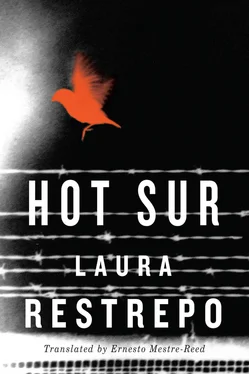Laura Restrepo - Hot Sur
Здесь есть возможность читать онлайн «Laura Restrepo - Hot Sur» весь текст электронной книги совершенно бесплатно (целиком полную версию без сокращений). В некоторых случаях можно слушать аудио, скачать через торрент в формате fb2 и присутствует краткое содержание. Год выпуска: 2015, Издательство: AmazonCrossingEnglish, Жанр: Современная проза, на английском языке. Описание произведения, (предисловие) а так же отзывы посетителей доступны на портале библиотеки ЛибКат.
- Название:Hot Sur
- Автор:
- Издательство:AmazonCrossingEnglish
- Жанр:
- Год:2015
- ISBN:нет данных
- Рейтинг книги:5 / 5. Голосов: 1
-
Избранное:Добавить в избранное
- Отзывы:
-
Ваша оценка:
- 100
- 1
- 2
- 3
- 4
- 5
Hot Sur: краткое содержание, описание и аннотация
Предлагаем к чтению аннотацию, описание, краткое содержание или предисловие (зависит от того, что написал сам автор книги «Hot Sur»). Если вы не нашли необходимую информацию о книге — напишите в комментариях, мы постараемся отыскать её.
María Paz is a young Latin American woman who, like many others, has come to America chasing a dream. When she is accused of murdering her husband and sentenced to life behind bars, she must struggle to keep hope alive as she works to prove her innocence. But the dangers of prison are not her only obstacles: gaining freedom would mean facing an even greater horror lying in wait outside the prison gates, one that will stop at nothing to get her back. Can María Paz survive this double threat in a land where danger and desperation are always one step behind, and safety and happiness seem just out of reach?
Hot Sur — читать онлайн бесплатно полную книгу (весь текст) целиком
Ниже представлен текст книги, разбитый по страницам. Система сохранения места последней прочитанной страницы, позволяет с удобством читать онлайн бесплатно книгу «Hot Sur», без необходимости каждый раз заново искать на чём Вы остановились. Поставьте закладку, и сможете в любой момент перейти на страницу, на которой закончили чтение.
Интервал:
Закладка:
“How did you come into the United States?” was the first thing the guy asked.
“Illegally,” she responded directly, casting intense rays with her eyes.
“How have you lived all this time?”
“Illegally.”
“Have you worked?”
“Yes sir.”
“You do know that’s against the law?”
“Yes sir, I do know. But I had no other choice.”
The man asked these questions without any sense of commiseration, without showing any sympathy; rather, on the contrary, with the self-importance of someone who feels he has more rights in this land because he arrived earlier. But Bolivia held her own, not letting him intimidate her, conscious of her tight sweater and her pretty face, and of her inner force. She talked to the man in Spanglish. But you have to understand, Mr. Rose, we’re talking about Bolivia’s Spanglish, which when I was a girl made me blush with shame, and that wasn’t any more than Spanish with a few okays here and a few thank yous there, and ohs and wows, batting her eyes and gesturing with her hands. But look how Regina Once’s trick worked, this running of the lights. While my mother answered the questions from the man, she repeated one phrase, one phrase, my mother concentrating, resolved, gazing right between his eyes with the power of that single phrase, as if she were firing an arrow, so that he’d feel that he was receiving an order he had to obey. Gimme the green card, sonofabitch, gimme the green card. Gimme the green card, sonofabitch, gimme the green card. And the man gave it to her.
“From now on behave yourself,” he told her. “No more funny stuff or you’ll end up in jail.”
Bolivia left there to place flowers by a photograph of Regina Once, although I think more than any spell, what worked for her was the honesty with which she responded to the questions. Once her green card was official, she began to work more than she had worked without it. If you asked me why she died so young, I’d have to say that she imploded from working. Aside from the green card, she also had a somewhat stable job and a place to put us in, so she was able to buy the plane tickets and pay for the papers to get a visa. So much waiting for that moment that would never come, and suddenly Bolivia tells me that this is it. Finally, the moment had come to reunite with her in America.
“Right now?” I managed to respond.
She told me yes, right away, in a voice that sounded strange, I supposed overcome with emotion. “This coming Wednesday,” she said, whimpering. “This Wednesday I’ll be in the airport with open arms.” That’s what she said. “I’ll be waiting for you, my girls, my girls. Bless me, Lord, my two daughters at last. Can you believe it, María Paz, can you believe it?” And then she thanked God again.
“What about school?” I asked. “Can’t I finish the semester here?”
“Aren’t you happy with the news?” she said, noticing my lack of excitement.
“Yes, Bolivia, it makes me happy.”
“Bolivia? No more Mami?”
“Yes, Mami, it makes me happy.”
You have to believe me, Mr. Rose, up to that moment it had been the truth. Up to that moment what I wanted more than anything was to reunite with Bolivia. At any other time during the first four years, I’d have gone insane with happiness to hear such news, because I waited for it day after day, hour after hour, with that broken coin hanging on my neck, hiding in the garage of the Navas’ house to write endless letters to Bolivia while I cried. But lately, I’d grown more used to saying Mami to Leonor, the owner of the house where I lived; I hope Bolivia can forgive me for that, wherever she is. I also didn’t correct those in school who thought that Caminaba and Patinaba were my sisters; on the contrary, I encouraged the confusion. It’s just that there were things. Somebody came to me with the gossip that Bolivia worked cleaning houses in America, and I didn’t like that. Then they told me that she ironed other people’s clothes, and I thought that was shameful. I had imagined her driving her new car down a wide boulevard lined with palm trees, and now they were telling me that she was a servant. Meanwhile, Leonor de Nava was a woman who could hire a servant, or even two, one to cook and one to clean. Do you see the difference? She was also the widow of an army officer, had a pension for life, and on weekends, we could go to the military club, a reason for pride and prestige up there in Las Lomitas, the neighborhood where we lived. And then there was my mother working as a servant who ironed other people’s clothes. Humble jobs, but at least they were in America, you may say, but I’d respond: Better to be the head of a mouse than the tail of a lion. But that saying doesn’t paint the whole picture quite right, because the fact is that in America my mother was a tail, but a mouse’s tail. Maybe that’s why I felt more like a person calling Leonor de Nava my mother and Caminaba and Patinaba my sisters, and that’s why I was somewhere else when they handed me the airplane ticket to reunite with Bolivia in America. I had just turned twelve, gotten my period, was the best student in English class, had tons of friends, and although I still didn’t go to parties with boys, I practiced the steps to the merengue and salsa and was a fan of Celia Cruz, Fruko y sus Tesos, and Juan Luis Guerra y 440, and I spent all day straightening my hair with a dryer and a round brush and then setting it in big curlers. And I had fallen in love with Alex Toro, a boy from the neighborhood who paid for school by working at night as a messenger for a discount pharmacy. Leonor often screamed from the bathroom, Why do we need another bottle of alcohol? Or who takes so many aspirins? Who bought more Merthiolate? And it was me. I’d call the pharmacy and order stuff to be delivered just to see Alex Toro. He’d ride over on his bike and bring me Condorito comic books and I’d lend him Roberto Carlos LPs. And that was all we did, but I thought that was love, the love of my life, and that’s why I wasn’t overjoyed by the great news of going to America finally. That dream had slowly become just that, a dream, a distant dream. And Bolivia had become something like the Virgin Mary, and America something like heaven. But my solid ground was Caminaba and Patinaba, Alex Toro, English classes, the military club on weekends, and salsa and merengue on the radio afternoons after school.
Maybe having a dream and being disillusioned is the same thing, two sides of the same coin, the dream that comes first and the letdown that follows. That’s the way the wheel turns, one and then the other, from dreams to disillusions and disillusions to dreams. It seems silly, but it takes a while to admit that life doesn’t proceed in a straight line, but that you wear yourself out in circles. That’s the kind of thing I have had to learn in prison, because here everything’s more intense, like when you were a child and they gave you a coloring book and instead of just coloring things by pressing the pencil softly, you sometimes felt like re-dyeing the whole thing, which is what we called it, re-dyeing, which meant you wet the tip of the pencil with your tongue so that the color would come out more strikingly, brilliantly, and evenly. Re-dyeing. Here in prison, that’s how things seem, re-dyed. Here in Manninpox, I have come to realize that if my mother was a mouse’s tail, my role in this story has been even more pathetic, going down to the category of mouse droppings.
Every morning at seven, unless it’s raining or we’re in isolation, they take us out to an interior yard they call the OSRU, for open space recreation unit. I’m not sure you ever saw it. You have the sky above, cement floor under your feet, and it is forty-two by fifteen steps. A space a little fucking tight for the one hundred thirty to one hundred fifty prisoners that share it. But it doesn’t matter, because you can see the sky, a glorious rectangle of blue, and there’s fresh air that fills your lungs so you can breathe again. In the winter, the yard is covered in snow and it is like a miracle to walk on that intact blanket, so soft and white, so resplendent and fallen from the sky, and that I first came to know here in America. I have told you, Colombia is tropical and there is no winter there. Every time Bolivia called me when I was staying with the Navas, I asked her, “Tell me, Mami, what’s snow like?” “Like lemon ice cream,” she responded. But among other things, the first thing that caught my attention when I saw that yard were the inmates walking around in a circle. Walking fast and faster in a circle, hugging those walls that kept them locked up. You know how this is here, a ridiculous Dracula’s castle with walls of reinforced concrete, without even a little crack to foster dreams of escape. They’d all be there, one hundred thirty to one hundred fifty women going around in circles, one behind the other, two deep, three deep, counterclockwise, like sleepwalkers trapped in their own dreams. This didn’t look like a jail but an insane asylum. And yet, after a week, I was doing it too, possessed of that urge to go around in circles without even asking myself what I was doing. It’s as if you need to break the bonds of confinement, and what drives you to walk in circles is the need to get out of here. Observe a caged tiger. Or any animal in a zoo, have you seen them? They go around and around, staying close to the bars, circling the space of their entrapment. We will never be able to go over the walls of that yard unless they crumble by the grace of God and the trumpets of Jericho. Searchlights and sirens await the spider woman who manages to climb to the top, and rolls of barbed wire, a swarm of blades, and electrified fences that will cut her to pieces, slice her, electrocute her, and mash her until she’s pulp. That’s why we go around in circles, I think. Maybe we are looking to close in that which encloses us, confine what confines us. They say that she who arrives on an island, sooner or later begins to go around it in circles. It’s called “rock fever.” We suffer from it here in Manninpox, and so every day we do the same thing.
Читать дальшеИнтервал:
Закладка:
Похожие книги на «Hot Sur»
Представляем Вашему вниманию похожие книги на «Hot Sur» списком для выбора. Мы отобрали схожую по названию и смыслу литературу в надежде предоставить читателям больше вариантов отыскать новые, интересные, ещё непрочитанные произведения.
Обсуждение, отзывы о книге «Hot Sur» и просто собственные мнения читателей. Оставьте ваши комментарии, напишите, что Вы думаете о произведении, его смысле или главных героях. Укажите что конкретно понравилось, а что нет, и почему Вы так считаете.












